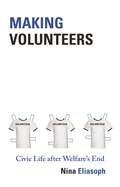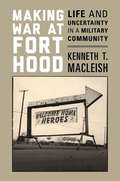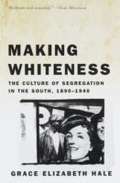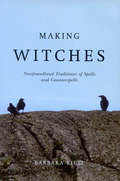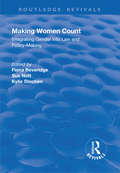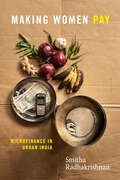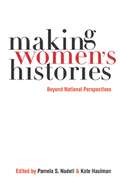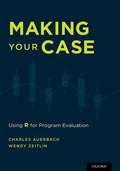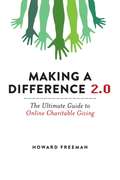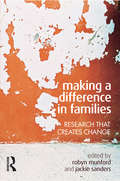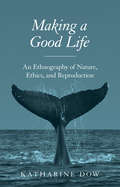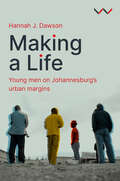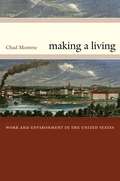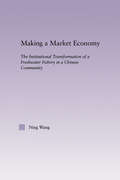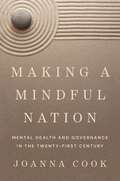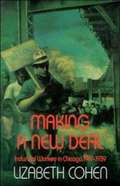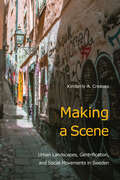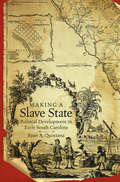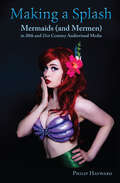- Table View
- List View
Making Volunteers: Civic Life after Welfare's End (Princeton Studies in Cultural Sociology #50)
by Nina EliasophAn inside look at how community service organizations really workVolunteering improves inner character, builds community, cures poverty, and prevents crime. We've all heard this kind of empowerment talk from nonprofit and government-sponsored civic programs. But what do these programs really accomplish? In Making Volunteers, Nina Eliasoph offers an in-depth, humorous, wrenching, and at times uplifting look inside youth and adult civic programs. She reveals an urgent need for policy reforms in order to improve these organizations and shows that while volunteers learn important lessons, they are not always the lessons that empowerment programs aim to teach.With short-term funding and a dizzy mix of mandates from multiple sponsors, community programs develop a complex web of intimacy, governance, and civic life. Eliasoph describes the at-risk youth served by such programs, the college-bound volunteers who hope to feel selfless inspiration and plump up their resumés, and what happens when the two groups are expected to bond instantly through short-term projects. She looks at adult "plug-in" volunteers who, working in after-school programs and limited by time, hope to become like beloved aunties to youth. Eliasoph indicates that adult volunteers can provide grassroots support but they can also undermine the family-like warmth created by paid organizers. Exploring contradictions between the democratic rhetoric of empowerment programs and the bureaucratic hurdles that volunteers learn to navigate, the book demonstrates that empowerment projects work best with less precarious funding, more careful planning, and mandatory training, reflection, and long-term commitments from volunteers.Based on participant research inside civic and community organizations, Making Volunteers illustrates what these programs can and cannot achieve, and how to make them more effective.
Making War at Fort Hood: Life and Uncertainty in a Military Community
by Kenneth T. MacLeishAn intimate look at war through the lives of soldiers and their families at Fort HoodMaking War at Fort Hood offers an illuminating look at war through the daily lives of the people whose job it is to produce it. Kenneth MacLeish conducted a year of intensive fieldwork among soldiers and their families at and around the US Army's Fort Hood in central Texas. He shows how war's reach extends far beyond the battlefield into military communities where violence is as routine, boring, and normal as it is shocking and traumatic.Fort Hood is one of the largest military installations in the world, and many of the 55,000 personnel based there have served multiple tours in Iraq and Afghanistan. MacLeish provides intimate portraits of Fort Hood's soldiers and those closest to them, drawing on numerous in-depth interviews and diverse ethnographic material. He explores the exceptional position that soldiers occupy in relation to violence--not only trained to fight and kill, but placed deliberately in harm's way and offered up to die. The death and destruction of war happen to soldiers on purpose. MacLeish interweaves gripping narrative with critical theory and anthropological analysis to vividly describe this unique condition of vulnerability. Along the way, he sheds new light on the dynamics of military family life, stereotypes of veterans, what it means for civilians to say "thank you" to soldiers, and other questions about the sometimes ordinary, sometimes agonizing labor of making war.Making War at Fort Hood is the first ethnography to examine the everyday lives of the soldiers, families, and communities who personally bear the burden of America's most recent wars.
Making Waves behind Bars: The Prison Radio Association
by Charlotte BedfordRadio produced and broadcast behind prison walls is redefining traditional meanings of ‘public service broadcasting’ and disrupting traditional power structures within the prison system. Focusing on one of the most interesting developments in UK prisons over the past 10 years, this book examines the early history of the Prison Radio Association and the formation of the first national radio station for prisoners. Highlighting the enduring importance of social values in broadcasting this book shows how radio can be used as a powerful force for social change. It will be of interest to those involved in media, criminal justice and social activism.
Making Weight
by M.D. Arnold Andersen Leigh Cohn M.D. Tom HolbrookThe negative body-image epidemic that affects millions of women is also a hidden problem for millions of men. In spite of a decade-long emphasis on health and fitness - or perhaps because of it - more men are suffering from a variety of eating disorders and self-abusive behaviors. Using vignettes from their patients, the authors present a new program to help men overcome these problems. They offer ways to enhance self-image, facts about why diets fail, information about the dangers of using steroids, and a section for women who want to help the men in their life.
Making Whiteness: The Culture of Segregation in the South, 1890-1940
by Grace Elizabeth HaleThis book explains how and why whiteness came to be such a crucial, embattled--and distorting--component of twentieth-century American identity.
Making Witches: Newfoundland Traditions of Spells and Counterspells
by Barbara RietiThere is a little-known tradition of witch lore in Newfoundland culture. Those believed to have the power to influence the fortunes of others are not mythological characters but neighbours, relations, or even friends. Drawing from her own interviews and a wealth of material from the Memorial University Folklore and Language Archive, Barbara Rieti explores the range and depth of Newfoundland witch tradition, looking at why certain people acquired reputations as witches, and why others considered themselves bewitched. The tales that emerge - despite their seemingly fantastic elements of spells and black heart books, hags, and healing charms - concern everyday affairs and reveal the intense social interdependence central to outport life. Frequently featuring women, they provide fascinating new perspectives on female coping strategies in a volatile economy. By addressing the perennial human issues at the heart of witchcraft - construction of enmity and intertwined fate - these narrative accounts also illuminate older witch beliefs revealed in witchcraft trial documents. Making Witches shows that in storytelling communities with a rich legacy of witch lore, witch tradition has endured well into the twentieth century.
Making Women Count: Integrating Gender into Law and Policy-making
by Kylie StephenThis title was first published in 2000. Drawn from an international research project, this study provides evidence of efforts to make law and policy-making truly inclusive, and discusses whether success or failure depends on the nature of the procedure, or the legal and social context. The book contains six case studies detailing national practice in promoting equality between the sexes and a series of general chapters which evaluate the effectiveness of individual equality stratgies and the factors which contribute to their success or failure. The contributors analyze the contribution of the European Union in promoting gender equality in Europe, and particular emphasis is placed on gender mainstreaming and how this strategy might be developed.
Making Women Pay: Microfinance in Urban India
by Smitha RadhakrishnanIn Making Women Pay, Smitha Radhakrishnan explores India's microfinance industry, which in the past two decades has come to saturate the everyday lives of women in the name of state-led efforts to promote financial inclusion and women's empowerment. Despite this favorable language, Radhakrishnan argues, microfinance in India does not provide a market-oriented development intervention, even though it may appear to help women borrowers. Rather, this commercial industry seeks to extract the maximum value from its customers through exploitative relationships that benefit especially class-privileged men. Through ethnography, interviews, and historical analysis, Radhakrishnan demonstrates how the unpaid and underpaid labor of marginalized women borrowers ensures both profitability and symbolic legitimacy for microfinance institutions, their employees, and their leaders. In doing so, she centralizes gender in the study of microfinance, reveals why most microfinance programs target women, and explores the exploitative implications of this targeting.
Making Women’s Histories: Beyond National Perspectives
by Kate Haulman Pamela S. NadellExamines how women's histories are explored and explained around the worldMaking Women's Histories showcases the transformations that the intellectual and political production of women’s history has engendered across time and space. It considers the difference women’s and gender history has made to and within national fields of study, and to what extent the wider historiography has integrated this new knowledge. What are the accomplishments of women’s and gender history? What are its shortcomings? What is its future?The contributors discuss their discovery of women’s histories, the multiple turns the field has taken, and how place affected the course of this scholarship. Noted scholars of women’s and gender history, they stand atop such historiographically-defined vantage points as Tsarist Russia, the British Empire in Egypt and India, Qing-dynasty China, and the U.S. roiling through the 1960s. From these and other peaks they gaze out at the world around them, surveying trajectories in the creation of women’s histories in recent and distant pasts and envisioning their futures.
Making Work, Making Trouble
by Deborah BrockThoroughly updated to include events that have occurred in the decade since it was originally published, this second edition of Making Work, Making Trouble re-establishes this work as the pre-eminent study of prostitution in Canada. Detailing the various forces that have presented prostitution as a social problem, Deborah R. Brock examines anti-prostitution campaigns, urban development, new policing strategies, and the responses of the media, the courts, and governments, as well as feminist, rights, and residents' organizations.Paying particular attention to rights and the means of economic survival within global and local realities, this edition includes new material on recent discourse on sex trafficking, migrant sex work, ex-worker rights organizing, and considers the potential impact of the Robert Pickton trial on the practice of sex work. A comprehensive overview of the crucial debates on prostitution, Making Work, Making Trouble is a welcome addition to twenty-first century sociology and criminology.
Making Your Case: Using R For Program Evaluation
by Charles Auerbach Wendy ZeitlinThis book specifically addresses using R to evaluate programs in organizational settings. The book is divided into three sections. The first section addresses background information that is helpful in conducting practice-based research. The second section of the book provides necessary background to begin working with R. Topics include how to download R and RStudio, navigation, R packages, basic R functions, and importing data. This section also introduces The Clinical Record, a freely available database program to help organizations record and track client information. The remainder of the book uses case studies to illustrate how to use R to conduct program evaluations. Techniques include data description and visualization, bivariate analysis, simple and multiple regression, and logistic regression. The final chapter illustrates a comprehensive summary of the skills demonstrated throughout the book using The Clinical Record as a data repository.
Making Yugoslavs
by Christian Axboe NielsenWhen Yugoslavia was created in 1918, the new state was a patchwork of Serbs, Croats, Slovenes, and other ethnic groups. It still was in January 1929, when King Aleksandar suspended the Yugoslav constitution and began an ambitious program to impose a new Yugoslav national identity on his subjects. By the time Aleksandar was killed by an assassin's bullet five years later, he not only had failed to create a unified Yugoslav nation but his dictatorship had also contributed to an increase in interethnic tensions.In Making Yugoslavs, Christian Axboe Nielsen uses extensive archival research to explain the failure of the dictatorship's program of forced nationalization. Focusing on how ordinary Yugoslavs responded to Aleksandar's nationalization project, the book illuminates an often-ignored era of Yugoslav history whose lessons remain relevant not just for the study of Balkan history but for many multiethnic societies today.
Making a Difference 2.0: The Ultimate Guide to Online Charitable Giving
by Howard FreemanThe digital age has changed the way people contribute to worthy causes, with more and more donations coming from online sources. Making a Difference 2.0 serves as a bible for tech-savvy contributors and an essential starting block for beginners, explaining the ins and outs of online charity, how it can differ from traditional methods of fundraising and donating, and how to ensure your contribution is being put to its best use. The book is targeted for two separate audiences- those that donate and those that utilize donations given to them. An exhaustive index is included listing and rating all online giving platforms.
Making a Difference in Families: Research that creates change
by Robyn Munford'This 'must read' volume will challenge every researcher to re-examine their assumptions and approach to research with families. Munford and Sanders emphasise the positive contribution research can make through the development of an inclusive research process. Their model extends the principles of the action research method by emphasising the contribution of families at each stage of the research, and dissemination of results through an easily assessable 'range of research products'. The thought-provoking case studies articulate the strengths and realities of applying their model in a wide variety of settings in different countries.' - Angeline Barretta-Herman, Professor of Social Work, University of St Thomas'This book tackles the hard issues which are becoming of vital importance for all researchers. How our research can make a difference to research participants and our communities, and also satisfy the needs of other players, are some of the difficult questions this book addresses. The book's direct approach, and its inclusion of work from around the globe, make it widely applicable.' - Professor Jan Fook, La Trobe UniversityDoing research with families poses particular challenges in social work and welfare. The families are generally clients of social services, and can be in a vulnerable position. Also, it is important that family research contributes to improving practice in clinical and community work.Making a Difference in Families discusses key approaches to research with families, including action research, focus groups and participant observation. Contributors explore both qualitative and quantitative methods, and examine ways in which researchers can involve participants in the research process. Detailed case studies are provided of research in a variety of settings, and with different kinds of family situations.
Making a Good Life: An Ethnography of Nature, Ethics, and Reproduction
by Katharine DowMaking a Good Life takes a timely look at the ideas and values that inform how people think about reproduction and assisted reproductive technologies. In an era of heightened scrutiny about parenting and reproduction, fears about environmental degradation, and the rise of the biotechnology industry, Katharine Dow delves into the reproductive ethics of those who do not have a personal stake in assisted reproductive technologies, but who are building lives inspired and influenced by environmentalism and concerns about the natural world's future.Moving away from experiences of infertility treatments tied to the clinic and laboratory, Dow instead explores reproduction and assisted reproductive technologies as topics of public concern and debate, and she examines how people living in a coastal village in rural Scotland make ethical decisions and judgments about these matters. In particular, Dow engages with people's ideas about nature and naturalness, and how these relate to views about parenting and building stable environments for future generations. Taking into account the ways daily responsibilities and commitments are balanced with moral values, Dow suggests there is still much to uncover about reproductive ethics. Analyzing how ideas about reproduction intersect with wider ethical struggles, Making a Good Life offers a new approach to researching, thinking, and writing about nature, ethics, and reproduction.
Making a Home in der Stadt: Aneignungsformen Jugendlicher im öffentlichen Raum (Sozialraumforschung und Sozialraumarbeit #28)
by Christian Reutlinger Axel Pohl Anna KrassJugendliche sind in besonderer Weise auf den öffentlichen Raum angewiesen, da sie im Aneignen von Orten und Plätzen ihre Zugehörigkeit zur Stadt – oder Making a Home – leben können. Ihre sichtbaren Formen der Aneignung werden jedoch oft nicht verstanden, sondern als auffällig und abweichend interpretiert. Städtische Akteur:innen sind deshalb angehalten, die Stadt zu schützen, sicher und sauber zu halten. Das Buch dreht die Perspektive auf dieses Phänomen um: Ausgangspunkt sind die jungen Menschen und ihre Formen des Making a Home. Dieses gilt es zu rekonstruieren und daran die Bemühungen einer jugendgerechten Stadtentwicklung auszurichten. Am Beispiel von Stuttgart wird der gemeinsame Prozess dargestellt und für die Leser:innen nachvollziehbar gemacht, den die städtischen den die städtischen Akteur:innen mit den Forscher:innen gegangen sind, dargestellt und für die Leser:innen nachvollziehbar gemacht.
Making a Life: Young Men on Johannesburg’s Urban Margins
by Hannah J DawsonMaking a Life explores the dynamic everyday life-making strategies of young men in Zandspruit, a sprawling informal settlement on the outskirts of Johannesburg. In many ways Zandspruit typifies the precariousness of life within South Africa, where two-thirds of young people lack waged employment. However, rather than seeing Zandspruit as dumping ground, Hannah Dawson calls for an integrated understanding of the complex linkages between people’s lives and livelihoods, and the multifaceted socio-political landscape of urban settlements. Based on 14 months of ethnographic research, Dawson investigates how social belonging, identity and economic realities intertwine in places such as Zandspruit. This approach not only challenges conventional approaches to studying work; it also questions the increasingly prevalent perspective that romanticises the adaptive survival strategies of the urban poor. By exploring the intricate connections between those with and without wages, the author shows how young men manage complex social, political and economic conditions. Making a Life offers insights into issues such as urban work, citizenship, un(der)employment and inequality in South Africa. At the same time, it contributes to a global understanding of how young people – men especially – manage economic uncertainty.
Making a Living
by Chad MontrieIn an innovative fusion of labor and environmental history, Making a Living examines work as a central part of Americans' evolving relationship with nature, revealing the unexpected connections between the fight for workers' rights and the rise of the modern environmental movement.Chad Montrie offers six case studies: textile "mill girls" in antebellum New England, plantation slaves and newly freed sharecroppers in the Mississippi Delta, homesteading women in the Kansas and Nebraska grasslands, native-born coal miners in southern Appalachia, autoworkers in Detroit, and Mexican and Mexican American farm workers in southern California. Montrie shows how increasingly organized and mechanized production drove a wedge between workers and nature--and how workers fought back. Workers' resistance not only addressed wages and conditions, he argues, but also planted the seeds of environmental reform and environmental justice activism. Workers played a critical role in raising popular consciousness, pioneering strategies for enacting environmental regulatory policy, and initiating militant local protest.Filled with poignant and illuminating vignettes, Making a Living provides new insights into the intersection of the labor movement and environmentalism in America.
Making a Market Economy: The Institutionalizational Transformation of a Freshwater Fishery in a Chinese Community (East Asia: History, Politics, Sociology and Culture)
by Ning WangFirst published in 2005. Routledge is an imprint of Taylor & Francis, an informa company.
Making a Mindful Nation: Mental Health and Governance in the Twenty-First Century
by Joanna CookHow mindfulness came to be regarded as a psychological support, an ethical practice and a component of public policyMindfulness seems to be everywhere—in popular culture, in therapeutic practice, even in policy discussions. How did mindfulness, an awareness training practice with roots in Buddhism, come to be viewed as a solution to problems that range from depression and anxiety to criminal recidivism? If mindfulness is the answer, asks Joanna Cook, what is the question? In Making a Mindful Nation, Cook uses the lens of mindfulness to show how cultivating a relationship with the mind is now central to the ways people envision mental health. Drawing on long-term fieldwork with patients, therapists, members of Parliament and political advocates in Britain, Cook explores how the logics of preventive mental healthcare are incorporated into people’s relationships with themselves, therapeutic interventions, structures of governance and political campaigns.Cook observed mindfulness courses for people suffering from recurrent depression and anxiety, postgraduate courses for mindfulness-based therapists, parliamentarians’ mindfulness practice and political advocacy for mindfulness in public policy. She develops her theoretical argument through intimate and in-depth stories about people’s lives and their efforts to navigate the world—whether these involve struggles with mental health or contributions to evolving political agendas. In doing so, Cook offers important insights into the social processes by which mental health is lived, the normative values that inform it and the practices of self-cultivation by which it is addressed.
Making a New Deal
by Lizabeth CohenThis book examines how it was possible and what it meant for ordinary factory workers to become effective unionists and national political participants by the mid-1930s. We follow Chicago workers as they make choices about whether to attend ethnic benefit society meetings or to go to the movies, whether to shop in local neighborhood stores or patronize the new A & P. Although workers may not have been political in traditional terms during the '20s, as they made daily decisions like these, they declared their loyalty in ways that would ultimately have political significance. As the depression worsened in the 1930s, not only did workers find their pay and working hours cut or eliminated, but the survival strategies they had developed during the 1920s were undermined. Looking elsewhere for help, workers adopted new ideological perspectives and overcame longstanding divisions among themselves to mount new kinds of collective action. Chicago workers' experiences as citizens, ethnics and blacks, wage earners and consumers all converged to make them into New Deal Democrats and CIO unionists. First printed in 1990, Making a New Deal has become an established classic in American History. The second edition includes a new introductory essay by Lizabeth Cohen.
Making a New Deal: Industrial Workers in Chicago, 1919-1939
by Lizabeth CohenA richly detailed portrait of working-class life in the 1920s and 1930s.
Making a Scene: Urban Landscapes, Gentrification, and Social Movements in Sweden
by Kimberly A. CreasapIn the three largest cities in Sweden, social movement “scenes”—networks of social movement actors and the places they inhabit—challenge threats such as gentrification. The geography of the built environment influences their ability to lay claim to urban space and to local political processes. In Making a Scene, Kimberly Creasap emphasizes that it is the centrality, concentration, and visibility of these scenes that make them most effective. Whereas some scenes become embedded as part of everyday life—as in Malmö—in contrast, scenes in Göteborg and Stockholm often fail to become part of the fabric of urban neighborhoods. Creasap investigates key spaces for scenes, from abandoned industrial areas and punk clubs to street festivals, bookstores, and social centers, to show how activists create sites and develop structures of resistance that are anti-capitalist, anti-fascist, anti-gentrification, queer, and feminist. She also charts the relationship between scenes and city spaces to show these autonomous social movements create their own cultural landscapes. Making a Scene encourages critical thinking about spatiality and place in the sociology of social movements and the role of social movements as important actors in urban development.
Making a Slave State: Political Development in Early South Carolina
by Ryan A. QuintanaHow is the state produced? In what ways did enslaved African Americans shape modern governing practices? Ryan A. Quintana provocatively answers these questions by focusing on the everyday production of South Carolina's state space—its roads and canals, borders and boundaries, public buildings and military fortifications. Beginning in the early eighteenth century and moving through the post–War of 1812 internal improvements boom, Quintana highlights the surprising ways enslaved men and women sat at the center of South Carolina's earliest political development, materially producing the state's infrastructure and early governing practices, while also challenging and reshaping both through their day-to-day movements, from the mundane to the rebellious. Focusing on slaves' lives and labors, Quintana illuminates how black South Carolinians not only created the early state but also established their own extralegal economic sites, social and cultural havens, and independent communities along South Carolina's roads, rivers, and canals.Combining social history, the study of American politics, and critical geography, Quintana reframes our ideas of early American political development, illuminates the material production of space, and reveals the central role of slaves' daily movements (for their owners and themselves) to the development of the modern state.
Making a Splash: Mermaids (and Mermen) in 20th and 21st Century Audiovisual Media
by Philip HaywardThe representation of aquatic people in contemporary film and television—from their on-screen sexuality to the mockumentaries they’ve inspired.Mermaids have been a feature of western cinema since its inception and the number of films, television series, and videos representing them has expanded exponentially since the 1980s. Making a Splash analyses texts produced within a variety of audiovisual genres. Following an overview of mermaids in western culture that draws on a range of disciplines including media studies, psychoanalysis, and post-structuralism, individual chapters provide case studies of particular engagements with the folkloric figure. From Hans Christian Andersen’s “The Little Mermaid” to the creation of Ursula, Ariel’s tentacled antagonist in Disney’s 1989 film, to aspects of mermaid vocality, physicality, agency, and sexuality in films and even representations of mermen, this work provides a definitive overview of the significance of these ancient mythical figures in 110 years of western audio-visual media.
